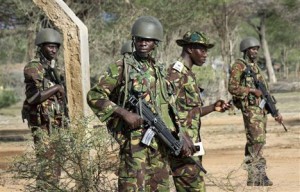The Kenyan air force has destroyed two Al Shebaab camps in Somalia, it said on Monday, in the first major military response since the extremist group massacred students at a Kenyan university last week, wrote timesofoman.
Al Shebaab denied the camps were hit, saying the air force bombs fell on farmland.
Gunmen from the Al Qaeda-aligned group killed 148 people on Thursday when they stormed the Garissa University College campus, some 200 km (120 miles) from the Somali border.
Jets pounded the camps in the Gedo region on the other side of the frontier on Sunday, Kenya Defence Forces spokesman David Obonyo said.
The mission was part of efforts to stop fighters from those camps carrying out cross-border raids into Kenya.
“Our aerial images show that the camps were completely destroyed,” he said, though cloud cover made it difficult to estimate the death toll.
Al Shebaab has killed more than 400 people on Kenyan soil in the last two years, including 67 during a siege at Nairobi’s Westgate mall in 2013, piling political pressure on President Uhuru Kenyatta that intensified with last week’s killings.
Kenya has struggled to stop the flow of militants and weapons across its porous 700-km border with Somalia, and the violence has also damaged the country’s economy by scaring away tourists and investors.
Sheikh Abdiasis Abu Musab, Al Shebaab’s military operations spokesman, told Reuters that none of its camps were damaged in Sunday’s raid, and that the fighter jets bombs had instead struck farmland.
“Kenya has not targeted any of our bases,” he said.
The rural Gedo region of Somalia is difficult to reach and reports about the raid could not be verified independently.
Message very clear
A government source on Monday said governors, members of parliament and security officials from regions bordering Somalia would compile a list of people suspected to have joined Al Shebaab or been radicalised.
“The message is very clear: we have to deal with this problem once and for all,” said the official, adding that regional governors discussed the idea with President Kenyatta on Monday.
Garissa was the most deadly attack on Kenyan soil since Al Qaeda bombed the American embassy in Nairobi in 1998, killing more than 200 people and wounding thousands more.
In the capital Nairobi, where local media have become increasingly critical of what they call a bungled security response to the Garissa attack, dozens of grieving families are still trying to identify bodies at the mortuary.



